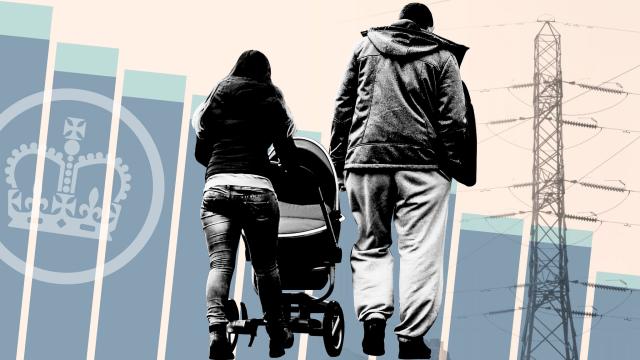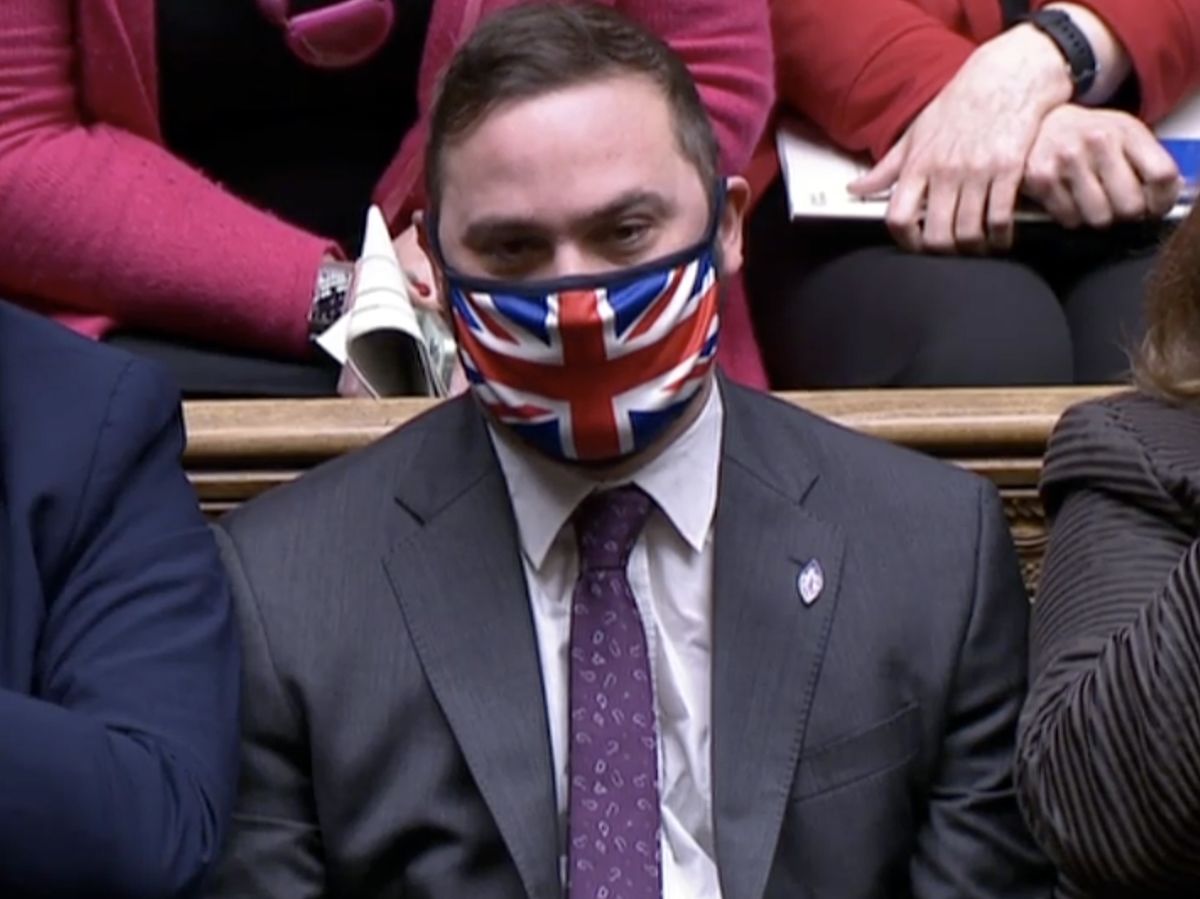
Soaring inflation may be impacting communities around the world, but in Britain the squeeze is coming from all directions – and as usual the poorest are feeling it the most.
Calling it the ‘year of the squeeze,’ Britons are in the throes of a cost-of-living crisis, with new data showing inflation jumped to 5.4 percent in December, its highest rate in 30 years.
The widespread increase in the cost of most goods and services are expected to jump even higher in the spring to levels in excess of 6 percent. As price inflation outstrips income inflation, many families are experiencing a fall in real income.
The soaring cost of food, fuel and energy – which are forecast to rise by about 50 percent to as much as £2,000 a year in April – have been coupled with cuts to the welfare benefit Universal Credit (UC) and rises to national insurance contributions, which are set to increase by 1.25 percent at the start of the new tax year in April.
Like the way the global financial crisis of 2008 hit the world’s poorest the hardest, it is the lowest income households in Britain that are bearing the brunt of the current economic turmoil.
Tory government accused of creating the cost-of-living crisis
By making unnecessary cuts to benefits while concurrently rising NI and allowing the price of household energy to hugely increase, the Conservative government has been accused of creating the “cost of living crisis.”
On Oct. 6, 2021, brutal cuts to welfare benefits saw low-income claimants lose the £20-a-week uplift to UC that was introduced as a means of helping struggling families get through the pandemic.
Research shows that almost half of UC claimants don’t think they can live on £20 less each week.
The UC cut is compounding the cost-of-living crisis for many living on shoestring budgets. But many factors are at play, resulting in soaring living costs that impoverished families simply cannot afford.
Brexit
Britain’s departure from the EU’s single market just over a year ago has been quietly reshaping patterns of trade with significant effects on the price of goods. Data from the British Retail Consortium and the research group NielsenIQ confirms that rising prices in shops are a result of driver shortages and the cost of Brexit-induced red tape.
Further price rises, and a shortage of products from Europe in the supermarkets, are likely to occur in the coming months. The six-month grace period to declare the origin of products entering the UK from the EU ended at the end of 2021, with experts warning of delivery delays and additional costs for bringing products into the UK.
With the post-Brexit customs law, known as Rules of Origin, now being implemented, many are cautioning that “things will get worse.”
“The longer and more costly process would lead to higher costs for the consumer as things become more time-critical and agents have to work harder to clear goods on arrival, and not relying on that six-month breathing space,” said the tax advisor Simon Sutcliffe. “This means that customs agents will raise their prices which will be passed on.”
Austerity bites
Between 2010 and 2020, successive Conservative governments sold austerity like it was a requisite response to the 2008 financial crash. During the decade of austerity, unemployment may have fallen but new jobs that emerged were notoriously low paid. As a consequence, debt reached mountainous levels in the austerity years.
In March 2020, as the first lockdown was enforced in Britain, each household owed an average of £15,385, not including mortgages.
Then, cruelly, the effects of the Covid-19 pandemic dug in, widening the gap between rich and poor. Studies found that deprived areas fared much worse during the health crisis, largely due to people living in poor areas being likelier to have experienced financial insecurity and a higher uptake of benefits.
In another twist of the knife to the poorest families, cuts have been made to welfare pay-outs, leading Britain’s welfare system to be described as ‘unfit for purpose.’
An urgent need to reform
With millions of families struggling to make ends meet amid the spiraling cost-of-living crisis, experts are urging for an urgent reform of the benefits system.
A two-year study by York and Birmingham universities and the Child Poverty Action Group documented the lives of 150 families on low incomes. The ‘Covid Realities’ study said the pandemic exposed and exacerbated existing problems with the benefits system.
“Our social security system is currently ill-suited to protect people from poverty, and to provide individuals with some level of security as they navigate what are often temporary challenges in their lives – for example, the loss of a job, relationship breakdown, parenting and care work or ill health,” said Ruth Patrick, a senior lecturer in social policy at York University and leader of the research programme.
To help combat the crippling financial issues millions of families are facing in Britain, the opposition party is calling for a “fundamental reform” to the benefits system.
Labour is also calling for a cut to VAT on energy bills and an expansion of the warm home discount scheme, which provides eligible applicants with a one-off discount on energy bills.
Jonathan Ashworth, shadow work and pensions secretary, said: “Years of Tory economic incompetence have landed working people, families and pensioners with rocketing heating bills, punishing tax rises, rising prices and the highest inflation for 30 years, which will mean a real-terms cut in the support people rely on this April. Coming on top of the Universal Credit cut, this will cause real hardship for families.”
However, for some thinkers such measures do not go far enough.
Two leading UK think tanks, the Joseph Rowntree Foundation and the Social Market Foundation, say urgent action is needed in the form of emergency payments.
The Social Market Foundation said it believes the government should bypass overcomplicated solutions to the cost-of-living crisis and provide a more simplified solution: making one-off cash payments to the millions of households in Britain that are having to choose between heating or eating this winter.
SMF’s chief economist, Dr. Aveek Bhattacharya, said the Chancellor, Rishi Sunak, should just “write millions of cheques.” Bhattacharya said he believes the UK should model an immediate support system on the US stimulus payment program that was available to eligible claimants during the pandemic.
During 2020, the US government distributed more than $400 billion in stimulus payments amid the health crisis, helping lift around 11.7 million people out of poverty, according to the Supplemental Poverty Measure (SPM).
Bhattacharya is now calling for similar measures to be introduced in the UK, stating: “The government should avoid the temptation to over-complicate its response and muddle its environmental objectives by subsidising energy.
“Instead, it should make direct cash payments to households and leave them to figure out how best to address their needs. A ‘cost of living bonus’, with a higher payment for those on low incomes, would do a lot to help struggling families and clearly demonstrate that the government is on their side.”
Similar demands are being made by the Joseph Rowntree Foundation, a think-tank aimed at inspiring social change through research, policy and practice.
Pointing to its own research that some 1.8 million children in Britain are being brought up in deep poverty – meaning that a family’s household income is so low it cannot afford to cover essential basics – JRF says the escalating numbers should “shame us all.”
Kate Schmuecker, deputy of policy and partnerships at JRF, has called for immediate emergency payments for people facing financial hardship to help them through the coming months.
“The case for targeting support to help people on the lowest incomes could not be clearer. But this must go hand in hand with urgent action to strengthen our social security system, which was woefully inadequate even before living costs began to rise,” Shmuecker said.
“Our basic rate of benefits is at its lowest real rate for 30 years and this is causing avoidable hardship. The government must do the right thing and strengthen this vital public service,” she added.
“Rising energy prices will affect everyone, but our analysis shows they have the potential to devastate the budgets of families on the lowest incomes. The government cannot stand by and allow the rising cost of living to knock people off their feet.”
Pay rises
Beyond distributing immediate payments and reforming a broken welfare system, alongside capping the price of essential items, pay rises is another solution to help lessen the cost-of-living crisis burden.














